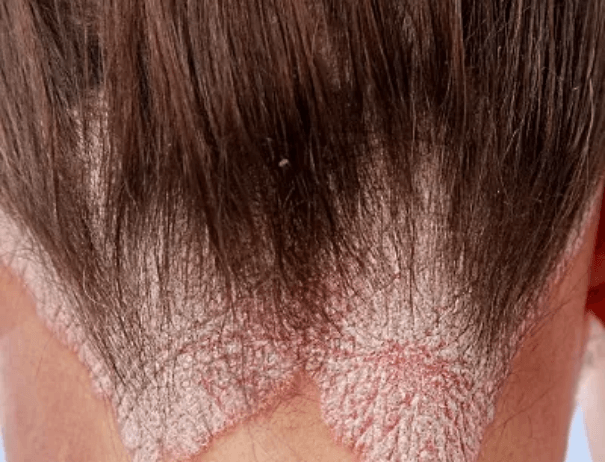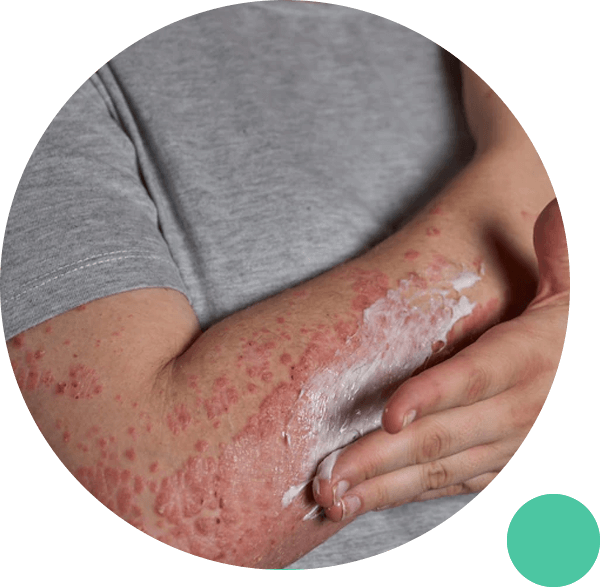Caring for Psoriasis: Symptoms, Triggers, and Treatment Approaches

Psoriasis is a chronic skin condition that affects millions of people worldwide. Characterized by red, scaly patches, it can be both physically uncomfortable and emotionally distressing. Understanding the symptoms, triggers, and treatment approaches is essential for managing psoriasis effectively.
At TelMDCare, we offer comprehensive online doctor consultations to help you manage this condition with ease and convenience.
Understanding Psoriasis Symptoms
Psoriasis symptoms can vary in severity and appearance. Common symptoms include:
- Red Patches: These are often covered with thick, silvery scales.
- Dry, Cracked Skin: The affected areas may bleed or itch.
- Itching and Burning: Psoriasis patches can be intensely itchy and sometimes painful.
- Thickened Nails: Nails may become pitted, ridged, or thickened.
- Swollen Joints: In some cases, psoriasis is associated with joint pain and swelling, known as psoriatic arthritis.
Recognizing these symptoms early can lead to a quicker diagnosis and treatment plan. If you suspect you have psoriasis, booking an online doctor appointment can provide you with a timely and accurate diagnosis. Our virtual doctor consultation services at TelMDCare make it easy to consult with a family doctor online, ensuring you receive the care you need without leaving your home.
Identifying Psoriasis Triggers
Psoriasis can be triggered by a variety of factors. Some common triggers include:
- Genetic Factors: Family history plays a significant role in the likelihood of developing psoriasis.
- Immune System Response: Psoriasis is an autoimmune disease, where the immune system mistakenly attacks healthy skin cells.
- Stress: High stress levels can trigger flare-ups.
- Infections: Throat infections and other illnesses can initiate or worsen psoriasis symptoms.
- Medications: Certain drugs, including lithium and beta-blockers, can trigger or exacerbate the condition.
- Injury to the Skin: Cuts, scrapes, and sunburns can lead to the development of new psoriasis patches.
Understanding these triggers can help in managing the condition effectively. Our primary care doctors online at TelMDCare can assist you in identifying your specific triggers and creating a personalized management plan.
Treatment Approaches for Psoriasis

There is no cure for psoriasis, but various treatments can help manage the symptoms. Treatment options include:
Topical Medications
Topical treatments are often the first line of defense against psoriasis. These include:
● Corticosteroids:
These reduce inflammation and slow down the rapid growth of skin cells.
● Vitamin D Analogues:
These help slow skin cell growth.
● Retinoids:
Derived from vitamin A, these can help reduce inflammation.
● Coal Tar:
An old remedy that can reduce scaling, itching, and inflammation.
Using these treatments as prescribed by a primary doctor online can provide significant relief for psoriasis symptoms. At TelMDCare, you can schedule a virtual doctor appointment to discuss these options and get prescriptions filled conveniently.
Phototherapy
Phototherapy involves exposing the skin to ultraviolet light under medical supervision. Types include:
● UVB Phototherapy:
This uses ultraviolet B light to slow the growth of affected skin cells.
● PUVA:
Combines a light-sensitizing medication (psoralen) with UVA light.
● Excimer Laser:
Targets specific areas with high-intensity UVB light.
Phototherapy can be effective, especially for those who have not responded to topical treatments. Consult with a dermatologist online to see if phototherapy is a suitable option for you.
Systemic Medications
For severe psoriasis, systemic medications may be necessary. These include:
● Methotrexate:
Reduces inflammation and suppresses the immune system.
● Cyclosporine:
An immunosuppressant that can bring rapid improvement.
● Biologics:
Target specific parts of the immune system to control inflammation.
Our virtual doctor online services at TelMDCare provide access to the best doctors on call who can guide you through these options and monitor your progress.
Lifestyle Modifications
In addition to medical treatments, certain lifestyle changes can help manage psoriasis:
● Healthy Diet:
Diet plays a critical role in managing inflammation related to psoriasis. Here are dietary recommendations:
- Foods to Avoid:Alcohol, high-fat dairy, refined carbohydrates, saturated/trans fats, added sugars, and gluten should be limited, as they can exacerbate psoriasis symptoms.
- Foods to Eat:Emphasize a balanced diet that includes fish, lean meats, legumes, plenty of fruits and vegetables, whole grains, and healthy fats like olive oil. This can help mitigate inflammation
● Stress Management:
Techniques such as meditation, yoga, and regular exercise can help lower stress levels.
● Skincare Routine:
Keeping the skin moisturized and avoiding harsh soaps can prevent flare-ups.
Our online doctor consultation services can provide you with personalized advice on lifestyle modifications that can complement your treatment plan.
Conclusion
Managing psoriasis involves understanding its symptoms, identifying triggers, and exploring various treatment options. At TelMDCare we offer comprehensive online medical consultation services to help you manage psoriasis effectively.
For more information, visit TelMDCare, Let us help you create psoriasis treatment plans with convenient and professional online doctor services. Sign up, today!